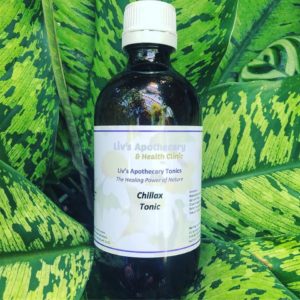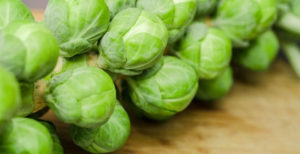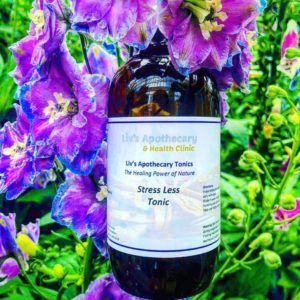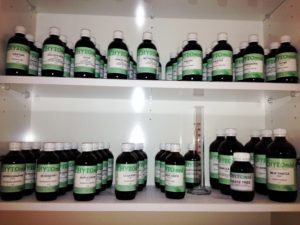The thyroid is a butterfly shaped gland located at the front of the neck. It plays a mighty role for its small size. It determines the body’s metabolic rate, energy levels and temperature. Hyperthyroidism is overactive thyroid, when the body over-produces thyroid hormone. Hypothyroidism is the opposite, where there is a deficiency of thyroid hormones.
Thyroid hormones 101: TSH = Thyroid Stimulating Hormone, T4 = inactive/storage thyroid hormone which is most abundant, and T3 = active thyroid hormone.
When the body’s metabolic rate and temperature are increased, these are the following signs and symptoms: rapid heart rate/palpitations, shortness of breath, goitre (swollen thyroid gland), increased perspiration, heat intolerance, shakiness, nervousness, anxiety, loose bowels, increased appetite, weight loss, insomnia, irritability, poor concentration, menstrual irregularities in women, and swollen, red, bulging eyes (seen in Grave’s disease). Check out my Chillax Tonic and Sleep Deep Tonic.

Progression – if left untreated, hyperthyroidism may result in arrhythmia (abnormal heart rate), hypertension (high blood pressure), heart failure, miscarriage, osteoporosis and bone fractures (hyperthyroidism causes bones to lose calcium faster than usual).
Causes:
The most common form of hyperthyroidism is an autoimmune condition called Grave’s disease, where the immune system attacks the body’s own thyroid tissue. Autoimmune conditions are genetic and often occur in tandem with another autoimmune condition.
Hyperthyroidism may also be caused hypothyroidism-treatment, as a result of taking too much thyroid hormone. Hyperthyroidism is more common in women than men, similarly to hypothyroidism.
Postpartum hyperthyroidism develops in about 1 in 10 women, due to hormonal fluctuations. It usually lasts one to two months, followed by several months of hypothyroidism. In most women, this naturally returns to normal.
Natural Treatment:
Individuals with compromised absorption are likely to be deficient in nutrients required by the thyroid. All autoimmune conditions and many other health conditions, are strongly linked to compromised gut function, particularly leaky gut (intestinal permeability).

- Eat goitrogens
These are foods that reduce thyroid function. They include soy products e.g. tofu, soy milk and many processed foods, plus brassica/cruciferous vegetables e.g. broccoli, cauliflower, cabbage, Brussel sprouts, kale, cavolo nero, radish, daikon radish, mustard greens, rocket, watercress, mizuna, turnips and maca. Eating these foods raw has a greater effect, as goitrogens are reduced with cooking. These foods can reduce thyroid function by blocking the activity of the enzyme thyro-peroxidase.

- Support the adrenals
The endocrine (hormone) system in our body, includes the thyroid gland and other glands in our body that produce hormones, regulating metabolism, growth and development, tissue function, sexual function, reproduction, sleep and mood. The thyroid gland and adrenal glands work closely together to support our energy levels and many other functions in the body. Therefore, often when one of these glands is imbalanced, the other is also. Check out my Stress Less Tonic and Enhance Your Resilience to Stress Blog.

- Lemon balm
Lemon balm is a herb that naturally slows thyroid function. It can be made into tea by pouring a cup of hot water over 2 teaspoons (2g) of dried lemon balm. Infuse the lemon balm in hot water for 5-10 minutes to ensure that the brew is strong. Place a lid over the cup to trap the volatile oils/essential oils from evaporating away. Drink this tea 2-3 times daily.
I can help you to determine the root cause of hyperthyroidism in your individual case. Hyperthyroidism is complex and multifaceted. A Naturopath can investigate if there are any other endocrine disorders interplaying. Dosages of herbs need to be determined by a Naturopath/Herbalist.





